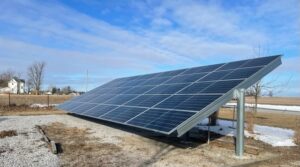 Karla Kauffman, of West Liberty, Ohio, has a longstanding interest in sustainable lifestyles. She spent countless hours researching, interviewing and writing a solar guide for churches for Mennonite Creation Care Network (MCCN). Karla is also a therapist, who is developing expertise in climate grief work, and a member of Jubilee Mennonite Church in Bellefontaine, Ohio.
Karla Kauffman, of West Liberty, Ohio, has a longstanding interest in sustainable lifestyles. She spent countless hours researching, interviewing and writing a solar guide for churches for Mennonite Creation Care Network (MCCN). Karla is also a therapist, who is developing expertise in climate grief work, and a member of Jubilee Mennonite Church in Bellefontaine, Ohio.
________________________________________
Metamora Mennonite Church is in the heart of Illinois farming country. In 2020, the church installed a 35-panel, ground-mounted solar panel array that covers much of the building’s electricity needs.
For Metamora Mennonite, installing solar panels was an act of stewardship, motivated by the fact that God created the earth and called it good.
Ron Sears, a member of the creation care team, connects the decision to caring for the land in other ways: “[Even though we are] not explicitly hugging trees, there is a … desire to care for God’s creation embedded in us. … Farmers are very conscientious about this. Even the ones who don’t farm organically have always engaged in conservation practices: erosion control, how you leave [the land] in the winter, … not trying to do the max on the herbicides …”
In 2018, an adult Sunday school class explored creation care. They started by hearing people’s stories. One farmer explained how he mitigates erosion; another, who farms organically, spoke about this choice; and there were other stories, as well. Solar power came up while they were working through MCCN’s Greener Congregation Scoresheet together. The pastor supported the idea, and so they began to “walk down the path to solar.”
A creation care committee was formed, and they created a timeline toward installation. The group got three estimates and presented proposals — first to the church leadership and then to the congregation via mailboxes and a Sunday announcement. When they presented the project at a congregational meeting, the questions that people asked were mostly financial. Written responses to members’ questions were placed in mailboxes after the meeting, as well. The proposal passed at the second meeting.
 Metamora’s project faced challenges. On the technical side, installing panels required an $8,000 electrical upgrade. Committee members considered putting the panels on the roof, but the roof was 20 years old and had a roofline that made it difficult to mount enough panels. Exploring a ground-mount option brought its own challenges: The state highway needed a 150-foot variance, and the church had only 110 feet to work with. Fortunately, the county eventually approved a 100-foot variance.
Metamora’s project faced challenges. On the technical side, installing panels required an $8,000 electrical upgrade. Committee members considered putting the panels on the roof, but the roof was 20 years old and had a roofline that made it difficult to mount enough panels. Exploring a ground-mount option brought its own challenges: The state highway needed a 150-foot variance, and the church had only 110 feet to work with. Fortunately, the county eventually approved a 100-foot variance.
Financially, the church was able to cover the $32,000 they needed for their panels. A $5,000 MCCN grant was a significant factor in the presentation for congregational approval. Illinois has an excellent Solar Renewable Energy Credit* program, so Metamora received a one-time $16,000 payback. The remainder came from an endowment the church had from the sale of a parsonage.
Metamora chose an installer who was local, had a good reputation and had a personal relationship with some church members. The panels were installed in July, but they did not begin functioning until November, due to inspections and other logistics. The solar array is by the highway and is easy for folks to see as they drive by.
“If you’ve got a building you’ll be in for a while, solar is an asset,” Sears concluded.
The congregation expects to recoup its investment in nine years.
* Several states offer Solar Renewable Energy Credits (SRECs), a trading system that allows customers to earn a small amount of money for each 1000 kilowatt-hours (kWh) produced. Utilities in these states are required by state regulations to get a percentage of their power from renewable sources.
The views and opinions expressed in this blog belong to the author and are not intended to represent the views of the MC USA Executive Board or staff.
Interested in submitting a blog for Menno Snapshots? Please see our blog guidelines here.
 Creation care is a focus for Mennonite Church USA (MC USA). Give to MC USA’s Creation Care fund to help MC USA live out its commitment to care for God’s creation amid current realities and the impact of environmental issues.
Creation care is a focus for Mennonite Church USA (MC USA). Give to MC USA’s Creation Care fund to help MC USA live out its commitment to care for God’s creation amid current realities and the impact of environmental issues.
This post is part of Mennonite Church USA’s Climate Justice: Learn, Pray, Join initiative.

Interested in solar? Use the Mennonite Creation Care Network’s guide to solar for U.S. churches.


